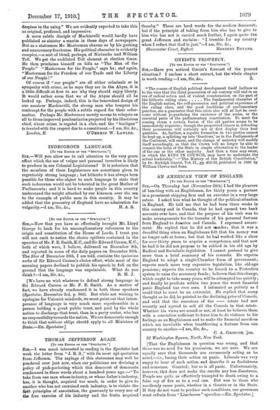GNEIST'S PROPHECY.
[TO THE EDITOR OP THE " SPECT•TOL."1
SIR,—Have you noticed Gneist's forecast of the present situation ? I enclose a short extract, but the whole chapter
is worth reading.—I am, Sir, &c., Z.
"The course of English political development itself inclines us to the view that the third generation of our century will end in an era of radical action and of violent counteraction on the part of the hitherto ruling class The fundamental character of the English nation, the self-possession and political experience of the ruling class, and the good traditions of parliamentary practice, are a guarantee that this crisis also will at last be over- come without jeopardising the existence of the realm, or the essential parts of the parliamentary constitution. To meet the coming storm a certain fusion of the old parties seems to be immediately requisite ; though the propertied classes in defending their possessions will certainly not at first display their best qualities. As, further, a regular formation in two parties cannot be kept up, a splitting up into 'fractions,' as in the Parliaments of the Continent, will ensue, and the change of ministry will modify itself accordingly, so that the Crown will no longer be able to commit the helm of the State in simple alternation to the leader of the one or the other majority. And then a time may recur, in which the KING IN COUNCIL may have to undertake the actual leadership."—" The History of the British Constitution," by Dr. Rudolph Gneist, Vol. II., pp. 452-53, published in 1886 by William Clowes and Sons.






















































 Previous page
Previous page